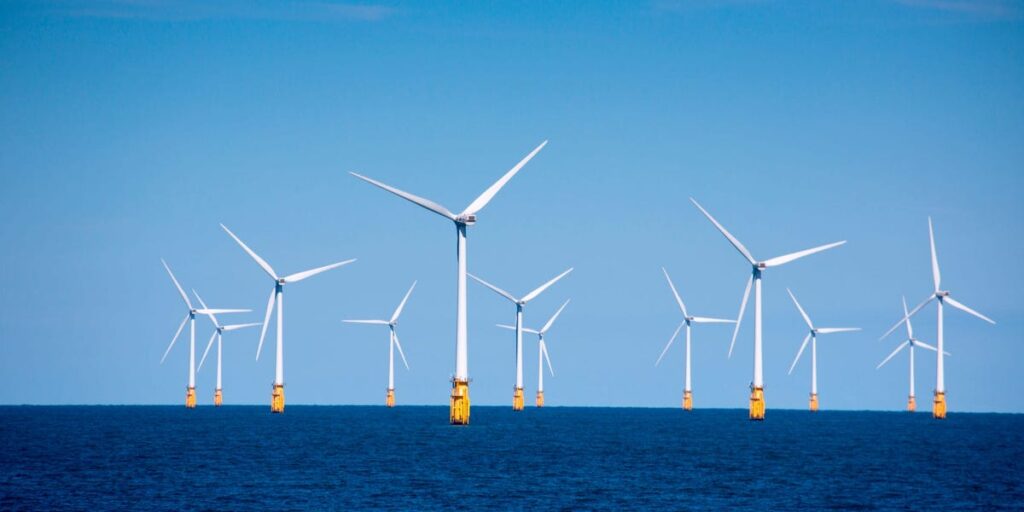The Trump administration’s proposed overhaul of green energy tax credits has jolted the climate tech sector — and investors and founders in the ecosystem are scrambling to make fallback plans.
Cleantech stocks tumbled in May after a bill cutting tax credits for clean energy incentives passed through the Republican-controlled House of Representatives.
Now, founders and investors are concerned about the knock-on impact this could have on the country’s climate tech ecosystem, which was burgeoning under the Biden-era Inflation Reduction Act, or IRA. They told Business Insider that Trump’s bill has stifled startup growth ambitions, pushing them to scale back, pivot to new geographies, or shut down entirely.
“There will be a graveyard of companies,” Matthew Nordan, general partner at clean tech fund Azolla Ventures, told BI. “And a lot of startups will hibernate to try to weather the storm.”
Early-stage startups are already beginning to feel the heat. In April, Spencer Gore, founder and CEO of Bedrock Materials, a sodium-ion battery startup, made an unusual announcement on LinkedIn: the startup would be returning most of its $9 million raised to investors and ceasing operations.
The company had plenty of operational cash, but “it was the techno-economics that led us to pull the plug,” Gore told BI, adding that the market conditions for climate tech startups in the US were hampered by waning industrial policy.
Startups are pivoting and eyeing new geographies
A byproduct of the new tax bill — and growing political backlash against ESG incentives — is that Europe is becoming more attractive for climate techs to set up shop.
Related stories
“There’s a dramatic retrenchment to Europe occurring within climate tech startups now. It’s broad-based, and the EU is doing the opposite of what the US is doing right now,” Nordan told BI.
Sam Kanner, the CEO of floating wind turbine startup Aikido, an Azolla portfolio company, told BI he’s considering moving his company to Europe. Trump’s executive orders have “put a chill on investor sentiment and project development in the US,” he said. There are “no longer any grant opportunities” through the Department of Energy or other agencies, he added, which means its “go-to-market strategy is now completely focused on Europe.”
Matthew Blain, an investor at Voyager Ventures, told BI that startups in the EU could turn to government funding from bodies such as the European Investment Fund, adding that “energy prices make the Nordics very attractive” as a hub.
Europe, in particular, has made significant headway in aligning regulatory frameworks with climate targets, which de-risks early-stage tech, said Todd Khozein, the CEO of SecondMuse. Kanner said that the UK, France, and Norway had “enacted supportive policies which have had the opposite effect on investors in those ecosystems”, encouraging private equity, infrastructure, and venture investors to back wind projects.
Startups are also eager to look beyond Europe for expansion.
“Generally speaking, the EU has made itself unattractive from a manufacturing standpoint, by over-relying on Russia. We’d look to Brazil, India, and the Middle East,” Max Kufner, the cofounder of carbon capture and utilization startup Again, told BI. “The Middle East is proving to be a viable partner in decarbonization.”
Right now, “a lot of climate tech entrepreneurs are asking themselves what it means to be an entrepreneur in the United States, and whether this is really the best place to attract and retain talent,” Gore said.
“What we’re seeing right now with startups is similar to the playbook we saw with Trump 1.0. A lot of companies will make a push to rebrand themselves as energy security and resilience funds,” Nordan said.
Climate tech startups have had a rocky year
The aftermath of a global tech downturn, rising interest rates, and mounting backlash against ESG incentives has made it increasingly difficult for climate tech startups to fundraise.
In the first quarter of 2025, climate startups secured $10 billion, down 50% from the $20 billion raised in Q1 of 2024, per PitchBook data.
Biden’s IRA offered climate companies billions of dollars worth of subsidies, tax credits, and rebates. The Trump administration is now attempting to roll back parts of the $369 billion initiative.
“Anything that relied on grants, that came out of the IRA, for first-of-a-kind (FOAK) projects, will be hit the hardest,” Nordan said.
For example, direct air capture startup Climeworks — which received a $50 million US government grant in 2024 — laid off over 100 employees in May. Its CEO told Bloomberg that the startup’s upcoming Louisiana plant would be delayed in light of the Trump administration’s green policy decisions.
HALLDOR KOLBEINS/AFP via Getty Images
Nordan anticipates more layoffs and shutdowns of companies that were dependent on government grants.
Offshore wind and solar projects have also been in Trump’s crosshairs. While these aren’t usually venture-backed categories, the steep reduction in staff at the Department of Energy’s loan program office, which provided debt funding to clean energy startups, will have a more debilitating impact on companies in these sectors, Voyager Ventures’ Blain said.
Still, investor appetite for nuclear fusion, long-duration energy storage, and startups making data centers more efficient has accelerated, partly due to the AI boom, which requires immense energy.


